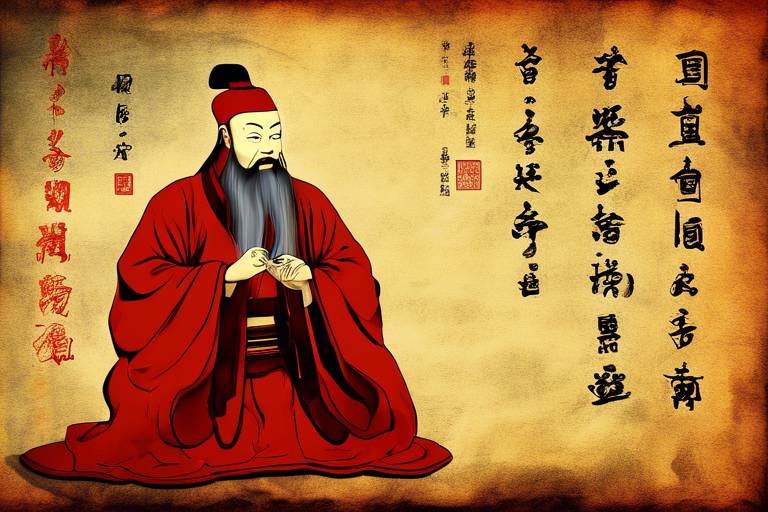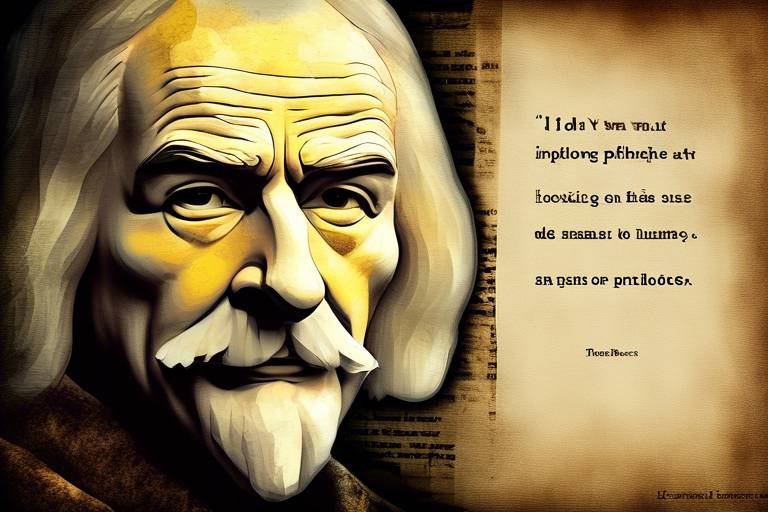Individualism - Philosophical Concepts and Implications
Individualism is more than just a buzzword; it's a profound philosophical concept that has shaped the way we view ourselves and our place in the world. At its core, individualism champions the idea that each person is unique, with their own thoughts, feelings, and rights. This notion encourages personal autonomy and self-reliance, making it a crucial element in the fabric of modern society. But what does it really mean to be an individual in today's interconnected world? In this article, we will dive deep into the essence of individualism, exploring its historical roots, key philosophical thinkers, and its implications for our lives today.
To truly grasp the concept of individualism, we must first understand where it came from. The historical roots of individualism can be traced back to a variety of philosophical movements, each contributing to its evolution over time. From the Renaissance, which sparked a renewed interest in human potential, to the Enlightenment, where reason and scientific thought began to dominate, individualism has been shaped by many influential ideas. Thinkers like Descartes and Locke laid the groundwork for personal freedom and the importance of self-identity. These early ideas paved the way for modern individualism, emphasizing the significance of personal rights and self-determination.
Throughout history, several philosophers have made significant contributions to the development of individualist thought. Their ideas have sparked debates and discussions that resonate even today. Notable figures such as John Stuart Mill and Friedrich Nietzsche have offered unique perspectives on personal freedom, autonomy, and the essence of being an individual. Each philosopher brings a different lens through which we can examine individualism, providing insights that are as relevant now as they were in their time.
John Stuart Mill, a prominent advocate for individual liberty, believed that personal choice and self-expression are fundamental to a fulfilling life. His seminal works, such as "On Liberty," argue that individuals should have the freedom to pursue their own happiness as long as it does not harm others. Mill's philosophy emphasizes the importance of individuality in the pursuit of the greater good, suggesting that a society that nurtures individual rights ultimately benefits everyone. His ideas challenge us to reflect on how we can balance personal freedom with societal welfare.
Mill's utilitarianism presents a fascinating intersection between individual rights and collective well-being. He posits that actions are right if they promote happiness and wrong if they produce the opposite. This raises essential questions: Can individual rights coexist with the needs of the majority? Mill's answer is a resounding yes. He argues that respecting individual rights is crucial for the overall happiness of society. In essence, when individuals are free to express themselves and pursue their own paths, they contribute to a richer, more diverse community.
One of Mill's most enduring contributions to individualism is his staunch defense of free speech. He believed that open discourse is essential for truth and progress. In today's world, where censorship and misinformation are rampant, Mill's arguments resonate more than ever. He contended that silencing opinions, even those we disagree with, stifles personal growth and societal advancement. His ideas encourage us to engage in dialogue and embrace diverse perspectives, ultimately enriching our understanding of the world.
Friedrich Nietzsche takes a different approach to individualism, challenging conventional morality and urging individuals to embrace their creativity. His concept of the Übermensch, or "Overman," embodies the ideal individual who transcends societal norms to create their own values. Nietzsche's philosophy encourages us to break free from the constraints of tradition and to forge our own identities. This radical perspective on individualism invites us to consider how we can redefine ourselves in a world that often imposes rigid expectations.
In today's fast-paced and interconnected world, individualism manifests in various ways, influencing everything from consumer behavior to social relationships. As we navigate through a landscape dominated by technology and globalization, the implications of individualism become even more pronounced. How does our understanding of self-identity shift in a world where personal expression is often showcased on social media? This section will explore how individualism shapes contemporary culture and affects our interactions with one another.
The relationship between consumer culture and individualism is complex and multifaceted. On one hand, consumerism offers individuals the opportunity to express their identities through their choices. On the other hand, it raises questions about authenticity. Are we truly expressing ourselves, or are we simply conforming to societal expectations? As we navigate this landscape, it's essential to reflect on how our consumer choices reflect our personal values and beliefs.
Social media has become a powerful tool for individual expression, allowing people to showcase their lives and opinions to a global audience. However, this digital landscape presents its own set of challenges. While social media amplifies individual voices, it can also lead to a homogenization of experiences, where people feel pressured to conform to popular trends. This dual role of social media in shaping modern identities raises critical questions about the nature of individuality in a connected world.
- What is individualism? Individualism is a philosophical concept that emphasizes the importance of the individual over the collective, advocating for personal autonomy and self-reliance.
- Who are some key philosophers associated with individualism? Influential philosophers include John Stuart Mill and Friedrich Nietzsche, each offering unique perspectives on personal freedom and identity.
- How does individualism manifest in modern society? Individualism is reflected in consumer choices, social media interactions, and the pursuit of personal identity in a globalized world.

Historical Roots of Individualism
To truly grasp the essence of individualism, we must embark on a journey through its historical roots. This concept didn't just pop up overnight; it has deep-seated origins that intertwine with significant philosophical movements and cultural shifts. Individualism blossomed during the Renaissance, a period that celebrated human potential and the importance of personal identity. Think of it as a vibrant garden where the seeds of self-expression were sown, nurtured by the rich soil of cultural rebirth.
The Renaissance was a time when people began to break free from the constraints of collective thought. Artists like Leonardo da Vinci and writers such as Shakespeare emphasized the uniqueness of the individual, showcasing their talents and perspectives like never before. This era marked a shift from a predominantly religious worldview to one that valued humanism, which placed human experience at the center of philosophical inquiry. It was a revolution of thought that paved the way for the emergence of individual rights and personal freedoms.
As we moved into the Enlightenment period, the focus on reason and individual rights intensified. Philosophers like René Descartes and Immanuel Kant championed the idea that individuals possess inherent worth and the capacity for rational thought. This was a game-changer! The Enlightenment thinkers argued that individuals should not only be seen as part of a collective but as autonomous beings capable of making their own choices. Their ideas laid the groundwork for modern democratic societies, where individual rights are enshrined in law.
Moreover, the American and French Revolutions in the late 18th century acted as catalysts for individualism. The cries for liberty, equality, and fraternity echoed the growing sentiment that individuals should have the freedom to pursue their own paths. These revolutions were not merely political upheavals; they were affirmations of the individual's right to exist and thrive outside the bounds of oppressive regimes. The Bill of Rights in the U.S. Constitution and the Declaration of the Rights of Man and of the Citizen in France are prime examples of how individualism was codified into law, ensuring that personal freedoms were protected.
To summarize, the historical roots of individualism are rich and complex, shaped by cultural, philosophical, and political transformations. This evolution is not just a timeline of events but a tapestry woven with the threads of human experience, thought, and aspiration. Understanding these roots allows us to appreciate the significance of individualism in our contemporary world, where the quest for personal identity and freedom continues to resonate.

Key Philosophers of Individualism
Individualism, as a philosophical concept, has been shaped and molded by various thinkers throughout history. These philosophers have laid the groundwork for understanding personal freedom, autonomy, and the role of the individual in society. Their ideas not only challenge the status quo but also inspire individuals to think critically about their own identities and choices. Among these influential figures, John Stuart Mill and Friedrich Nietzsche stand out for their profound contributions to individualist thought.
Starting with John Stuart Mill, he is often regarded as one of the most significant advocates for individual liberty. Mill’s writings emphasize the importance of personal choice and self-expression, arguing that individuals should be free to pursue their own paths as long as they do not harm others. His key works, such as On Liberty, delve into the essence of freedom, suggesting that a society thrives when its members are allowed to express their unique identities without fear of repression. Mill's perspective is not just about personal freedom; it’s about the flourishing of society as a whole, where diverse thoughts and lifestyles can coexist.
On the other hand, Friedrich Nietzsche offers a more radical view of individualism. Nietzsche challenges conventional morality and societal norms, urging individuals to embrace their own values and create their own destinies. Central to his philosophy is the concept of the Übermensch, or "Overman," which represents an ideal individual who transcends societal limitations and forges their own path. Nietzsche’s call for self-overcoming and creativity encourages individuals to reject herd mentality and cultivate their unique identities. His provocative ideas invite us to question the very foundations of our beliefs and the societal structures that shape our lives.
Both Mill and Nietzsche provide essential frameworks for understanding individualism, yet they approach the subject from different angles. While Mill emphasizes the harmony between individual rights and the greater good, Nietzsche focuses on the necessity of personal creativity and self-assertion. This divergence highlights the rich tapestry of individualist thought, where different perspectives coexist and challenge one another.
To further explore their contributions, let's take a look at a brief comparison of their philosophies:
| Philosopher | Key Ideas | Impact on Individualism |
|---|---|---|
| John Stuart Mill | Liberty, Utilitarianism, Freedom of Expression | Advocated for personal choice and the importance of individuality within society. |
| Friedrich Nietzsche | Übermensch, Self-Overcoming, Critique of Morality | Promoted the idea of creating one's own values and rejecting societal norms. |
In conclusion, the contributions of Mill and Nietzsche to the philosophy of individualism are invaluable. Their ideas continue to resonate today, prompting us to reflect on our own identities and the role of individualism in a rapidly changing world. As we navigate through modern society, their teachings remind us of the importance of personal freedom and the courage to be ourselves amidst societal pressures.
- What is individualism? Individualism is a social and philosophical concept that emphasizes the moral worth of the individual and the importance of personal autonomy and self-expression.
- Who are the key philosophers associated with individualism? Key philosophers include John Stuart Mill and Friedrich Nietzsche, who have significantly influenced the understanding of personal freedom and identity.
- How does individualism manifest in modern society? Individualism is evident in contemporary culture through consumer choices, self-identity, and social media, reflecting personal values and expressions.

John Stuart Mill's Contributions
John Stuart Mill, a towering figure in the realm of philosophy, has made profound contributions to the concept of individualism, emphasizing the paramount importance of personal liberty and self-expression. His writings, particularly in "On Liberty," advocate for the idea that individuals should have the freedom to pursue their own paths, as long as they do not harm others. Mill argues that this freedom is essential not only for personal development but also for societal progress. Imagine a garden where every flower blooms in its unique way; this diversity of expression is what Mill champions as vital for a thriving society.
One of Mill's key contributions is his exploration of the delicate balance between individual rights and the collective good. He posits that while society has a role in regulating behavior, it should do so with caution and respect for personal autonomy. Mill's utilitarian philosophy suggests that actions should be judged based on their consequences, advocating for a form of governance that maximizes happiness while safeguarding individual freedoms. This brings us to a crucial question: how do we ensure that the rights of the individual do not become overshadowed by the demands of the majority?
To illustrate Mill's perspective, consider the following table that summarizes his views on individual rights versus societal welfare:
| Aspect | Individual Rights | Societal Welfare |
|---|---|---|
| Definition | Personal freedoms and choices | Well-being of the community |
| Importance | Essential for self-development | Necessary for social harmony |
| Conflict | May clash with majority interests | Can limit individual expression |
Mill's advocacy for freedom of expression is another cornerstone of his philosophy. He famously stated, "He who knows only his own side of the case knows little of that." This assertion underscores the necessity of diverse viewpoints for a well-rounded understanding of any issue. In today's world, where discussions about censorship and free speech are more relevant than ever, Mill's arguments resonate strongly. He believed that suppressing opinions, even those we might find offensive, hinders the pursuit of truth and stifles intellectual growth. This perspective invites us to reflect on our own views: Are we open to hearing dissenting opinions, or do we shy away from them?
In summary, John Stuart Mill's contributions to individualism are not merely academic; they challenge us to consider the implications of our freedoms in a modern context. His emphasis on personal liberty, the balance of rights and societal needs, and the importance of free expression are all vital components of a healthy, functioning society. As we navigate the complexities of contemporary life, Mill's insights remind us that individualism is not just about personal gain, but about fostering a community where diverse voices can thrive.

Utilitarianism and Individual Rights
Utilitarianism, as championed by John Stuart Mill, proposes that the best action is the one that maximizes overall happiness or utility. But how does this principle align with the concept of individual rights? At first glance, it may seem like a tug-of-war between the needs of the many and the rights of the individual. Yet, Mill's perspective offers a fascinating synthesis of these seemingly opposing ideas. He argues that individual rights are not just important for personal freedom; they are essential for the overall well-being of society.
To understand this balance, consider the following points:
- Individual Rights as a Foundation: Mill believed that protecting individual rights is crucial for achieving the greatest happiness. When individuals are free to express themselves, pursue their interests, and make choices, society as a whole benefits from the diversity of thought and innovation.
- The Harm Principle: Mill's famous harm principle states that individuals should be free to act however they wish, as long as their actions do not harm others. This principle serves as a crucial boundary that protects individual rights while still allowing for the maximization of overall happiness.
- Long-Term Utility: Mill contended that respecting individual rights leads to long-term benefits for society. A society that values personal freedoms fosters trust, cooperation, and social stability, which ultimately enhances collective happiness.
Mill's approach to utilitarianism emphasizes that individual rights are not merely a luxury but a necessity for a flourishing society. When individuals are empowered to pursue their own happiness, they contribute to the greater good. This perspective challenges the notion that utilitarianism inherently sacrifices individual rights for the sake of the majority. Instead, it reveals a more nuanced understanding where the protection of individual freedoms can coexist harmoniously with the pursuit of collective well-being.
In contemporary discussions, this balance becomes even more relevant. As we grapple with issues such as privacy, freedom of speech, and social justice, Mill's insights remind us that the protection of individual rights is not just about personal liberty; it's about cultivating a society where everyone can thrive. The ongoing debate about how to balance individual freedoms with societal needs echoes Mill's principles and highlights the enduring relevance of his thought in our modern landscape.

Freedom of Expression
Freedom of expression stands as one of the cornerstones of individualism, a concept that John Stuart Mill championed with fervor. Mill argued that the ability to express oneself freely is not just a personal right but a necessary component of a thriving society. Imagine a world where every thought and idea is stifled; creativity would wither, innovation would stagnate, and the very essence of humanity would be dulled. Mill believed that the open exchange of ideas leads to a better understanding of truth and helps society progress. In his seminal work, On Liberty, he famously stated, "He who knows only his own side of the case knows little of that." This highlights the importance of listening to diverse perspectives to foster a more informed populace.
Mill's defense of free speech is particularly relevant in today's digital age, where social media platforms have transformed how we communicate. While these platforms offer unparalleled opportunities for individual expression, they also raise significant challenges. For instance, the rapid spread of misinformation can lead to societal division, and the pressure to conform can stifle genuine expression. It's a double-edged sword: on one hand, we have the ability to share our thoughts and connect with others globally; on the other hand, we face the risk of being silenced or misrepresented.
Furthermore, Mill argued that freedom of expression is essential for personal development. When individuals are allowed to voice their opinions, they engage in a process of self-discovery. This process can be likened to a sculptor chiseling away at a block of marble; each word and idea shapes their identity. Without this freedom, individuals may find themselves trapped in a mold created by societal expectations, unable to explore their true selves. Mill's perspective encourages us to embrace our unique voices, as it is through this expression that we contribute to the rich tapestry of human experience.
However, the question remains: where do we draw the line between freedom of expression and the potential harm it can cause? Mill believed that the only justification for limiting free speech is when it directly harms others. This principle is often summarized in the phrase "the harm principle." It raises critical discussions about hate speech, misinformation, and the responsibilities that come with freedom. As we navigate these complex waters, we must balance our right to speak freely with the need to protect individuals and communities from harm.
In conclusion, freedom of expression is a vital aspect of individualism that fosters personal growth and societal advancement. It challenges us to engage, listen, and evolve. As we continue to grapple with the implications of this freedom in our modern world, we should remember Mill's wisdom: the pursuit of truth and understanding often requires us to embrace the uncomfortable and the controversial. Ultimately, it is this very freedom that allows us to flourish as individuals and as a society.
- What is freedom of expression? - Freedom of expression is the right to express one's thoughts, opinions, and beliefs without censorship or restraint.
- Why is freedom of expression important? - It is essential for personal development, societal progress, and the pursuit of truth.
- Are there limits to freedom of expression? - Yes, speech that directly harms others may be restricted, as per the harm principle proposed by John Stuart Mill.
- How does social media impact freedom of expression? - Social media amplifies individual voices but also poses challenges such as misinformation and societal pressure to conform.

Friedrich Nietzsche's Perspective
Friedrich Nietzsche, a towering figure in philosophy, is often associated with the idea of individualism, but his perspective is anything but conventional. He challenges the very foundations of societal norms and morality, advocating for a radical form of self-creation and personal authenticity. Nietzsche's philosophy is like a clarion call to individuals to transcend societal expectations and embrace their unique paths, which he famously encapsulated in the concept of the Übermensch. This term, often translated as "Overman" or "Superman," represents an ideal individual who creates their own values and lives beyond the constraints imposed by traditional morality.
Nietzsche's critique of conventional morality is profound. He argues that traditional moral values, often rooted in religious dogma, suppress individual creativity and strength. Instead of adhering to societal norms, Nietzsche encourages individuals to forge their own identities and values. He believed that true freedom comes from the ability to question everything, including one’s own beliefs and values. This radical skepticism is not just an intellectual exercise; it is a call to action for individuals to take charge of their lives and destinies.
One of the key elements of Nietzsche's philosophy is the idea of the will to power. This concept suggests that the fundamental driving force in humans is not merely survival or reproduction, but a deep-seated desire to assert and enhance one's existence. In this light, individualism becomes a matter of harnessing this will to power to shape one’s life according to personal desires and aspirations. Nietzsche believed that those who embrace their will to power can rise above mediocrity and become creators of their own destiny.
Nietzsche's perspective also emphasizes the importance of self-overcoming. He argues that individuals must constantly strive to overcome their limitations and societal constraints. This process of self-overcoming is akin to a sculptor chiseling away at a block of marble to reveal a masterpiece within. In this way, Nietzsche sees individualism as a dynamic process of growth and transformation, rather than a static state of being. It is about pushing boundaries, challenging oneself, and ultimately becoming the best version of oneself.
Moreover, Nietzsche's thoughts on individualism resonate deeply in our modern context, particularly in discussions surrounding authenticity and self-expression. In an age where social media and consumer culture often dictate trends and behaviors, Nietzsche's call for authenticity is more relevant than ever. He would likely argue that true individualism requires rejecting the superficiality of societal pressures and embracing one’s true self, regardless of external validation.
In summary, Nietzsche's perspective on individualism is a powerful reminder of the importance of personal freedom, self-creation, and authenticity. His philosophy urges us to question societal norms, embrace our unique identities, and strive for self-overcoming. In a world that often promotes conformity, Nietzsche's ideas serve as a beacon for those seeking to carve out their own paths and live fully as individuals.
- What is the Übermensch concept? The Übermensch, or "Overman," is an ideal individual in Nietzsche's philosophy who creates their own values and lives beyond societal constraints.
- How does Nietzsche view traditional morality? Nietzsche critiques traditional morality as a suppressive force that hinders individual creativity and authenticity.
- What does the will to power mean? The will to power is the fundamental drive in humans to assert and enhance their existence, according to Nietzsche.
- Why is authenticity important in Nietzsche's philosophy? Authenticity is crucial because it represents the rejection of societal pressures and the embrace of one's true self.

Übermensch
This article explores the core ideas of individualism, its historical context, and its impact on society, politics, and personal identity. We will analyze various dimensions of individualism and its relevance today.
Understanding the origins of individualism provides insight into its evolution. This section examines key philosophical movements and thinkers that shaped the concept, from the Renaissance to modern times.
This segment highlights influential philosophers who have contributed to the development of individualist thought, including John Stuart Mill and Friedrich Nietzsche, and their respective views on personal freedom and autonomy.
Mill's advocacy for individual liberty emphasizes the importance of personal choice and self-expression. This subheading delves into his key works and their implications for individualism.
Exploring Mill's utilitarianism reveals how individual rights can coexist with the greater good. This section discusses the balance between personal freedom and societal welfare.
Mill's defense of free speech is crucial to individualism. This part examines his arguments and their relevance in contemporary discussions about censorship and freedom.
Nietzsche's philosophy challenges conventional morality and promotes individual creativity. This subheading explores his concept of the and its implications for personal identity.
The term , often translated as "Overman" or "Superman," is central to Friedrich Nietzsche's philosophy. It represents an idealized individual who transcends the limitations of conventional morality and societal norms. Nietzsche envisioned the as a creator of values, someone who embraces life with all its chaos and uncertainty. This figure embodies the spirit of individualism, as it is characterized by self-overcoming and personal authenticity.
Nietzsche believed that traditional moral systems imposed constraints on human potential. In his view, the rejects these constraints and instead forges a unique path, guided by personal instincts and desires. This perspective invites us to contemplate the following:
- What does it mean to live authentically?
- How can we create our own values in a world filled with pre-existing moral codes?
- In what ways can we strive to become our own ?
By embracing the concept of the , Nietzsche challenges us to reflect on our own lives. Are we merely conforming to societal expectations, or are we actively shaping our destinies? The serves as a metaphor for the ultimate individual, one who breaks free from the herd mentality and dares to explore the depths of personal freedom.
This section analyzes how individualism manifests in contemporary culture, affecting aspects like consumerism, self-identity, and social relationships in a globalized world.
The relationship between consumer culture and individualism raises questions about authenticity and self-expression. This part examines how consumer choices reflect personal values.
Social media platforms amplify individual expression but also present challenges. This subheading discusses the dual role of social media in shaping modern identities and community engagement.
Q: What is individualism?
A: Individualism is a philosophical and social concept that emphasizes the moral worth of the individual and advocates for personal autonomy and self-reliance.
Q: Who is the Übermensch?
A: The Übermensch is a concept introduced by Friedrich Nietzsche, representing an ideal individual who transcends societal norms and creates their own values.
Q: How does individualism impact society?
A: Individualism can lead to greater personal freedom and creativity but may also result in social fragmentation and a lack of community cohesion.

and its implications for personal identity.
When we dive into the concept of individualism, we can't help but notice how it fundamentally shapes our personal identity. Individualism encourages each person to carve out their own path, leading to a profound sense of self that is distinct from societal norms and expectations. Think of it as a vibrant tapestry woven from countless threads, where each thread represents a unique experience, belief, or choice. This rich diversity is what makes our identities so fascinating and complex.
At the heart of individualism lies the idea that every person has the right to define who they are. This leads to a few essential implications for personal identity:
- Self-Expression: Individualism champions the notion of expressing one's true self, free from the constraints of societal pressures. This freedom allows individuals to explore their passions, beliefs, and preferences openly.
- Authenticity: In a world that often pushes conformity, individualism promotes authenticity. People are encouraged to embrace their quirks and idiosyncrasies, fostering a deeper connection with their true selves.
- Personal Responsibility: With the emphasis on individual choice comes the weight of responsibility. Individuals must own their decisions and their consequences, which can lead to personal growth and maturity.
Moreover, individualism has a ripple effect on how we relate to others. It can foster a sense of community among those who share similar values, creating networks of support that celebrate uniqueness. However, it also poses challenges; as people prioritize their personal identities, they may inadvertently create barriers to understanding and connection with others who have different perspectives.
In the context of modern society, where social media reigns supreme, the implications of individualism are magnified. Platforms like Instagram and Twitter allow individuals to curate their identities and present them to the world. This has led to a phenomenon where personal branding becomes essential, and the lines between authenticity and performance blur. While some celebrate this as a new form of self-expression, others caution that it may lead to superficial connections and a loss of genuine interaction.
In essence, individualism plays a crucial role in shaping our personal identities in a rapidly changing world. It encourages us to explore who we are at our core, but it also challenges us to navigate the complexities of living in a diverse society. As we embrace our individuality, we must also remain open to understanding the identities of others, creating a balance that enriches our shared human experience.
1. What is individualism?
Individualism is a philosophical and social concept that emphasizes the moral worth of the individual. It advocates for personal freedom, self-reliance, and the pursuit of individual goals, often contrasting with collectivist ideologies.
2. How does individualism affect personal identity?
Individualism allows people to define their own identities based on personal choices and experiences, promoting self-expression and authenticity while also encouraging personal responsibility.
3. What are the challenges of individualism in society?
While individualism fosters unique identities, it can also lead to isolation and superficial relationships, particularly in the age of social media, where personal branding may overshadow genuine connections.
4. Can individualism coexist with community values?
Yes, individualism can coexist with community values by encouraging diverse expressions of identity while fostering understanding and support among individuals who may have different perspectives.

Individualism in Modern Society
In today's fast-paced world, the concept of individualism has taken on new dimensions, influencing how we perceive ourselves and interact with others. It's fascinating to consider how this philosophical idea, which emphasizes personal autonomy and self-expression, shapes our everyday lives. From the moment we wake up and choose our outfits to the way we curate our online personas, individualism is woven into the fabric of modern existence. But what does it really mean to be an individual in a society that often pushes for conformity?
One of the most visible manifestations of individualism today is through consumerism. The choices we make as consumers are often seen as extensions of our identities. Think about it: when you purchase a specific brand, are you just buying a product, or are you also sending a message about who you are? For many, shopping is not merely a transaction; it’s a way of expressing personal values and lifestyles. This relationship between consumerism and individualism raises intriguing questions about authenticity. Are we truly expressing ourselves, or are we simply following trends dictated by societal norms?
Moreover, the rise of social media has amplified the conversation around individualism. Platforms like Instagram, Twitter, and TikTok allow us to showcase our unique perspectives and talents to a global audience. This democratization of expression enables individuals to craft their identities in ways that were previously unimaginable. However, there’s a flip side to this coin. While social media fosters individual expression, it can also create pressure to conform to certain ideals. The curated lives we see online can lead to comparisons that undermine our sense of self, making it essential to find a balance between self-expression and the influence of others.
To illustrate these dynamics, consider the following table that outlines the pros and cons of individualism in modern society:
| Pros of Individualism | Cons of Individualism |
|---|---|
| Encourages personal freedom and self-expression. | Can lead to feelings of isolation and loneliness. |
| Promotes innovation and creativity. | May foster a sense of competition over community. |
| Empowers individuals to pursue their passions. | Can result in superficial relationships. |
As we navigate this landscape, it's crucial to recognize the impact of individualism on our social relationships. While the pursuit of personal goals can be fulfilling, it’s essential to maintain connections with others. After all, human beings are inherently social creatures. Finding a balance between celebrating our individuality and nurturing our relationships can lead to a more enriching life experience. This balance is particularly important in a world where the lines between online and offline interactions are increasingly blurred.
In conclusion, individualism in modern society is a double-edged sword. It offers us the freedom to express ourselves and shape our identities, but it also challenges us to remain connected to the community around us. As we embrace our unique paths, let’s not forget the value of shared experiences and relationships, which can enrich our lives in ways that individual pursuits alone cannot.
- What is individualism? Individualism is a philosophical concept that emphasizes the moral worth of the individual, advocating for personal autonomy and self-expression.
- How does consumerism relate to individualism? Consumerism allows individuals to express their identities and values through their purchasing choices, making it a significant aspect of modern individualism.
- What role does social media play in individualism? Social media platforms amplify individual expression but can also create pressures to conform, complicating the experience of personal identity.

Consumerism and Identity
In today's fast-paced world, the relationship between consumerism and personal identity has never been more intricate. As we navigate through life, we often find ourselves making choices that reflect who we are, or at least who we aspire to be. But have you ever stopped to think about how much of your identity is shaped by what you buy? It’s a fascinating yet somewhat unsettling realization that our purchases can speak volumes about our values, beliefs, and even our social status. In many ways, consumerism has become a canvas on which we paint our identities, but it also raises critical questions about authenticity.
When we think about consumerism, it’s easy to picture shopping malls, online stores, and advertisements bombarding us at every turn. But the implications of this culture run much deeper. For many, the act of purchasing is not just about acquiring goods; it’s a way of expressing individuality. This phenomenon can be observed in various aspects:
- Brand Loyalty: Many people develop strong attachments to specific brands, often because they feel that these brands reflect their personal values or lifestyles. For example, someone might choose to wear sustainable fashion labels as a statement of their commitment to environmental issues.
- Social Media Influence: Platforms like Instagram and TikTok have transformed the way we perceive consumer goods. Influencers showcase products not just as items for sale, but as symbols of a lifestyle that many aspire to emulate.
- Personal Narratives: The products we own often become part of our personal stories. A vintage jacket might remind us of a specific time in our lives, or a high-tech gadget could symbolize our embrace of innovation.
However, this connection between consumerism and identity is not without its pitfalls. The pressure to conform to certain consumer trends can lead to a loss of individuality. When everyone is chasing after the latest gadget or fashion trend, how do we maintain a sense of authenticity? The irony is that while consumer choices can be a form of self-expression, they can also create a homogenized culture where true individuality is overshadowed by the desire to fit in.
Moreover, the relentless pursuit of material goods can sometimes lead to a cycle of dissatisfaction. We live in a world where the next big thing is always just around the corner, and this can create a sense of emptiness. Are we buying things to enhance our lives, or are we simply trying to fill a void? This brings us to the critical question of whether our identities are genuinely our own or merely reflections of societal expectations.
To further illustrate this complex relationship, consider the following table, which outlines the contrasting aspects of consumerism and identity:
| Aspect | Consumerism | Identity |
|---|---|---|
| Expression | Buying products to showcase personal style | Defining self through choices and values |
| Influence | Advertising and social media trends | Authenticity vs. conformity |
| Impact | Possession of goods as status symbols | True self vs. societal expectations |
In conclusion, the interplay between consumerism and identity is a double-edged sword. While it offers avenues for self-expression, it also poses challenges to our authenticity. As we continue to navigate this complex landscape, it’s essential to reflect on our choices and consider what they truly say about us. Are we curating our identities, or are we simply following the crowd? The answers to these questions will shape not only our personal narratives but also the broader cultural narrative in this age of consumerism.
Q1: How does consumerism affect personal identity?
Consumerism can shape personal identity by influencing the choices we make and the values we express through our purchases. It can serve as a form of self-expression, but it can also lead to conformity and a loss of authenticity.
Q2: Is it possible to maintain authenticity in a consumer-driven society?
Yes, it is possible to maintain authenticity by being mindful of our choices and focusing on what truly resonates with our values rather than succumbing to societal pressures.
Q3: How can I ensure my purchases reflect my true self?
To ensure your purchases reflect your true self, consider what values are most important to you, seek out brands that align with those values, and prioritize quality over quantity in your consumer choices.

Social Media and Individualism
In the digital age, social media has emerged as a powerful force that shapes our understanding of individualism. Platforms like Facebook, Instagram, and Twitter allow us to express our thoughts, showcase our identities, and connect with others across the globe. But have you ever paused to think about how this affects our sense of self? While social media can be a platform for self-expression, it can also lead to a paradox where individualism is both celebrated and challenged.
On one hand, social media empowers individuals to share their unique stories, talents, and perspectives. Users can create profiles that reflect their personalities, interests, and beliefs, allowing them to curate their online identities. This phenomenon can be likened to a digital canvas where everyone is an artist, painting their lives with the colors of their choices. For many, this freedom fosters a sense of autonomy and encourages personal growth. However, this constant quest for individuality can also create pressure to conform to societal expectations, as users often feel compelled to present a polished version of themselves.
Moreover, the algorithms that drive social media platforms often prioritize content that aligns with popular trends or viral moments, which can dilute individual expression. As people chase likes and shares, the question arises: are we truly being ourselves, or are we merely echoing what we think will resonate with others? This dynamic can lead to a superficial understanding of identity, where the line between authentic self-expression and performance blurs.
Additionally, social media fosters a sense of community, allowing individuals to connect with like-minded people and find support. However, this can also lead to the formation of echo chambers, where diverse perspectives are drowned out by a chorus of similar voices. In such environments, individualism can be stifled, as the need for acceptance and validation may outweigh the desire for genuine self-expression. It's a double-edged sword: while we can find our tribe online, we may also lose the richness that comes from engaging with differing viewpoints.
To illustrate the impact of social media on individualism, consider the following table that outlines the positive and negative effects of social media on personal identity:
| Positive Effects | Negative Effects |
|---|---|
| Empowerment through self-expression | Pressure to conform to trends |
| Connection with like-minded individuals | Formation of echo chambers |
| Opportunities for personal branding | Superficial engagement with identity |
| Access to diverse communities | Loss of authenticity |
In conclusion, social media serves as a double-edged sword in the realm of individualism. While it offers unprecedented opportunities for self-expression and connection, it also poses challenges that can undermine genuine individuality. As we navigate this complex landscape, it's essential to reflect on how we engage with these platforms and strive to maintain our authentic selves amidst the noise. After all, the essence of individualism lies not just in how we present ourselves to the world, but in our ability to embrace our true identities, free from external pressures.
- How does social media influence personal identity?
Social media influences personal identity by providing a platform for self-expression and connection but can also create pressure to conform and present a curated version of oneself. - Can social media promote individualism?
Yes, social media can promote individualism by allowing users to share their unique stories and connect with like-minded individuals, but it may also lead to echo chambers that stifle diversity. - What are the risks of using social media for self-expression?
The risks include the potential for superficial engagement, loss of authenticity, and the pressure to conform to trends or societal expectations.
Frequently Asked Questions
- What is individualism?
Individualism is a philosophical concept that emphasizes the moral worth of the individual. It champions personal freedom, self-reliance, and the pursuit of one's own goals and values. Individualists believe that each person should have the right to make choices that affect their lives, independent of societal norms or pressures.
- How did individualism develop historically?
The roots of individualism can be traced back to the Renaissance, where a shift in thinking began to prioritize the individual over collective identities. Key philosophical movements, including Enlightenment thought, played a significant role in shaping individualist ideas, with thinkers like John Stuart Mill and Friedrich Nietzsche challenging traditional views on morality and society.
- Who are some key philosophers associated with individualism?
John Stuart Mill and Friedrich Nietzsche are two prominent figures in the development of individualist philosophy. Mill's work focused on personal liberty and the importance of free expression, while Nietzsche challenged conventional morality and encouraged individuals to embrace their unique identities through concepts like the Übermensch.
- What role does individualism play in modern society?
In today's world, individualism manifests in various ways, particularly through consumerism and social media. It influences how people express their identities, make choices, and interact with one another. However, it also raises questions about authenticity, community, and the balance between personal freedom and social responsibility.
- How does consumerism relate to individualism?
Consumerism and individualism are intertwined, as people often use their purchasing choices to express their identities and values. This relationship prompts discussions about the authenticity of self-expression and whether consumer culture enhances or undermines true individuality.
- What challenges does social media pose to individualism?
While social media platforms provide avenues for individual expression, they also present challenges such as the pressure to conform and the potential for superficial connections. This dual role can complicate how individuals perceive themselves and their relationships with others in a digital age.



















